What is ESP in Relation to ESL Teaching?

English for Specific Purposes (ESP) is a niche within the realm of English language teaching that offers a unique and tailored approach. While many English teachers focus on general language proficiency, ESP educators direct their attention to students with specialized needs, whether it be in medical, aviation, business, or various other professions.
Table of Contents
What language level are ESP students?
How does ESP differ from general ESL teaching?
What resources are available to teach ESP classes?
Are you ready to teach English as a foreign language?
Check out what our course grads say in our many video testimonials!
This specialization not only requires distinct teaching methods but also calls for a solid understanding of the unique characteristics of ESP students. In this guide, we will delve into the intricacies of ESP teaching, providing insights into the level and age of students, the distinguishing features that set ESP apart from general ESL teaching, and the available resources to create effective ESP lessons. Whether you're already an ESP teacher or considering this rewarding path, this article will equip you with essential knowledge to excel in the field of English for Specific Purposes.
What is ESP?
Teaching ESP (Teaching English for Specific Purposes) is a branch of general ESL teaching for which you would qualify if you hold a general TEFL or TESOL qualification. It relates to specialized teaching for various professions, such as medical, aviation, and specific businesses.
What language level are ESP students?
Due to the nature of ESP, your students will generally have a higher English language level. Typically, they will already be at the Intermediate or Upper Intermediate level on the 5-level scale of language learners. As a result, your focus will be on vocabulary and grammar items required in their professional duties rather than the topics often presented in a General English class.
What age are ESP students?
Again, as they are professionals, they will most likely be aged 20 years and up, ranging all the way up to the general retirement age of the country in which you are teaching.
How does ESP differ from general ESL teaching?
There are several differences between these two forms of English teaching, with some of the more important aspects being that with ESP:a. Teaching methods tend to be more goal-oriented and make use of task-based concepts.b. Students generally bring a higher level of motivation to the classroom as they aim to achieve a specific employment outcome.c. Language skills taught are specific to a particular discipline.
What resources are available to teach ESP classes?
All major publishing houses have books designed to cater to various disciplines covered by ESP. However, many teachers find it more efficient to adapt these materials or create their own to tailor them to the specific needs of the students in front of them.
If you are going to create or adapt materials for ESP, several important factors need to be taken into consideration, including, but not limited to:a. What does the teacher know about the content being taught?b. What do the students need to know about the content being learned?c. What are the language conventions within the particular discipline being covered?d. What are the learning objectives?ESP resources are typically designed to serve the linguistic needs of the discipline being taught and, therefore, are more task-oriented than general English resources. When teaching an ESP class, it is important to make yourself aware of the purposes for which they use English. With this in mind, some general English materials may be adapted to suit your ESP class.
In summary:
• ESP is a branch of ESL teaching that focuses on English for professional use.• ESP is generally taught to higher-level, older students.• The language skills required by ESP students are specific to their employment.• ESP materials may be specific or adapted from general English materials.
If you have a general TEFL or TESOL qualification, you can teach ESP. You would need to familiarize yourself with the specific language requirements of your students. One way to achieve this is to 'work shadow' them for a short period to see firsthand what they use English for.
Are you ready to teach English as a foreign language?
Apply now & get certified to teach english abroad!
Speak with an ITTT advisor today to put together your personal plan for teaching English abroad!
Send us an email or call us toll-free at 1-800-490-0531 to speak with an ITTT advisor today.
Related Articles:
- Top 10 Cities in Europe with the Highest Demand for English Language Teachers
- 5 Reasons To Take A TEFL Course Right Now - Even If You Are Not Leaving Yet | ITTT | TEFL Blog
- All the Documents You Will Need to Teach English Abroad
- The Impact of Positive Motivation on an ESL Classroom
- You're Never Too Old to Change Your Life and Do a TEFL Course | ITTT | TEFL Blog
- Getting Student Placement Right - The Best Desk Arrangements for EFL Students



